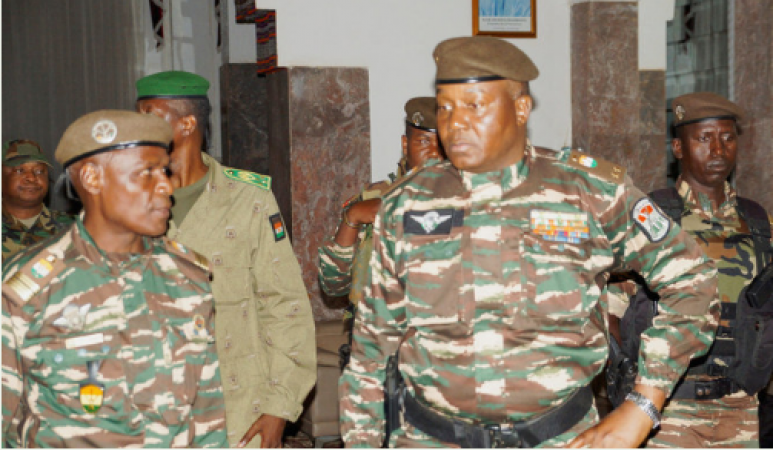
Niamey: Due to a coup against one of the last democratic allies of the West against Islamic extremists in West Africa, the world is imposing economic sanctions. Families in one of the world's poorest countries might suffer as a result.
Many people in the capital of Niger live in improvised housing tied together with slats of wood, sheets, and plastic tarps because they are unable to pay their rent and struggle every day to make enough money to feed their kids.
Along with 140 other people, Salou Hassan and his family reside in a two-room hut by the side of the road. The family bathes in public showers and sleeps on wooden slats that are close to the ground without running water or electricity.
Also Read: Women are "brutalised" by a warming world, and heat waves widen the gender gap
Finding food for my kids is the hardest part, according to Hassan, 30. His sons are 5 and 6 years old.
When things go well, Hassan can make about $6 per day selling water door to door. He needs nearly $70 to fix his broken wheelbarrow but doesn't have it. At the central market, his wife cleans stalls for less money than Hassan does.
Hassan is hardly aware that the nation's president was removed from office. He said, "I'm looking for money to buy food for my family."
Also Read: Ukraine's Humanitarian Aid Appeal Faces Critical Shortfall: Only 30% of $3.9 Billion Target Reached
The neighbouring countries of Niger are threatening armed intervention against the head of the presidential guard-led junta, but analysts say there is little chance that they will be successful in deploying troops.
Niger, which was a French colony until 1960, has recently received military assistance and hundreds of millions of dollars in humanitarian aid from both the United States and France. The French military conducts joint operations in the north while the US and France train the Nigerien military.
Since the coup that removed President Mohamed Bazoum, demonstrators in favour of the junta have been carrying Russian flags and praising that nation.
In March, US Secretary of State Antony Blinken travelled to Niger to fortify relations and announce $150 million in direct aid, describing it as "a model of democracy." France has approximately 1,500 troops in Niger and left Mali last year.
On Sunday, the ECOWAS regional organisation in West Africa announced travel and economic sanctions against Niger in response to the coup. They also threatened to use force if the coup leaders did not restore him within a week.
The 15-nation bloc has attempted, with varying degrees of success, to defend democracies against the threat of coups since the 1990s.
Sanctions may cause Niger's more than 25 million people to become even more impoverished because of its reliance on foreign aid. All business and financial dealings between ECOWAS members and Niger have been halted, and all Niger-related assets held by regional central banks have been frozen.
Niger needs to find a way to avoid the sanctions because they could be disastrous, Prime Minister Ouhoumoudou Mahamadou told Radio France Internationale on Sunday.
"It's very challenging for people when people say there's an embargo, land borders are closed, air borders are closed... The international community is extremely important to Niger, he said.
In West and Central Africa, where there have been nine successful or attempted coups since 2020, four countries are ruled by military governments.
One of the bloodiest conflicts in Africa occurred in Liberia in the 1990s, and because of ECOWAS's intervention, many people are now hesitant to get involved in internal conflicts. Yahya Jammeh's predecessor, ECOWAS, intervened in The Gambia in 2017 to stop him from interfering with the transfer of power. According to the Global Observatory, which conducts research on peace and security issues, about 7,000 troops from Ghana, Nigeria, and Senegal entered the nation. The majority of people thought the intervention succeeded in its goal.
According to Niger analysts, if the regional bloc resorts to using force, it could lead to conflict not only between ECOWAS and Niger forces but also between civilians who are in favour of the coup and those who are opposed to it.
Although unlikely, Rida Lyammouri, senior fellow at the Policy Centre for the New South, a think tank with offices in Morocco, said that if putschists chose confrontation, "the consequences on civilians of such an approach would be catastrophic."
Due to the potential for violence, Lyammouri does not see a "military intervention happening," he claimed.
After the announcement of the sanctions, Blinken praised the ECOWAS leadership's resolve to "defend constitutional order in Niger" and joined the group in demanding the immediate release of Bazoum and his family.
The military junta is already repressing the government and civil liberties after seizing control on Wednesday when members of the presidential guard surrounded Bazoum's home and detained him.